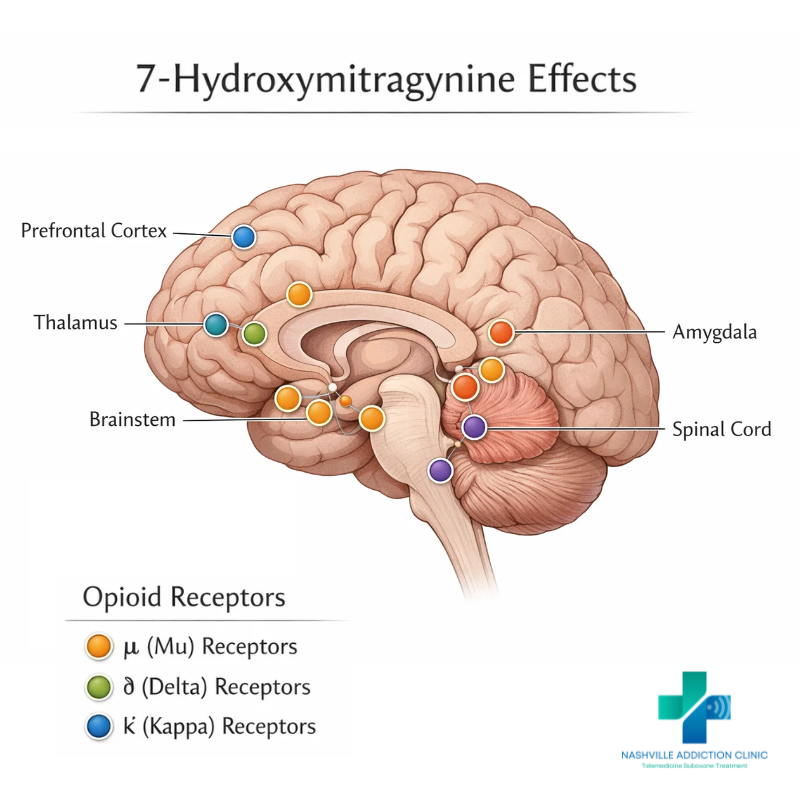How to Quit Kratom | Virtual Suboxone Treatment in Tennessee

If you’re searching for how to quit kratom, you’re not alone—and you’ve come to the right place. Many men and women, aged 18 to 65, living in Tennessee—whether in Nashville, Chattanooga, Knoxville, Memphis, Kingsport or elsewhere—struggle with kratom and opioid dependence. It can feel overwhelming, especially with legal issues, past abuse, or the fear of opioid withdrawal. But recovery is possible, and you don’t have to quit alone.
What Is Kratom & Why Quitting Matters
- What is kratom? Kratom (Mitragyna speciosa) is a plant product often used to self-manage pain, anxiety, or opioid withdrawal. Its active ingredients (mitragynine and 7-hydroxymitragynine) act on opioid receptors in the brain. (American Addiction Centers)
- Health risks: The FDA has warned that kratom is not approved for any medical use, and that it carries risks of liver toxicity, seizures, substance use disorder, and possibly death—especially when combined with other substances. (U.S. Food and Drug Administration)
- Kratom Use Disorder (KUD): Studies show many people meet DSM-5 criteria for substance use disorder with kratom, including tolerance, cravings, withdrawal, and unsuccessful quit attempts. (PubMed)
Because kratom can lead to serious adverse effects—legal, mental, physical, even lethal overdose in rare cases—it’s critical to have a safe plan for how to quit kratom.
How to Quit Kratom Safely: Step-by-Step
Learning how to quit kratom involves planning, medical support, and often using tools already proven for opioid dependence. Here’s how:
1. Recognize Your Current Dependency
- Monitor cravings, tolerance (needing more kratom to get same effect), and withdrawal symptoms when you try to cut back.
- Mental health status: if you’ve experienced trauma, abuse, depression or anxiety. These all affect how difficult quitting may be.
2. Understand Kratom Withdrawal Symptoms
Common kratom withdrawal symptoms include:
- Gastrointestinal upset: nausea, diarrhea, abdominal cramps
- Sleep disturbances: insomnia, restless sleep
- Physical symptoms: sweating, tremors, hot flashes
- Mental/emotional symptoms: anxiety, irritability, depressed mood, intense cravings
- Time-frame: symptoms often start 12-48 hours after last use, and may last several days to a week or more, depending on dose and duration of use. (American Addiction Centers)
3. Medical Detox & Tapering vs. Going “Cold Turkey”
- Detox under medical supervision is much safer. Home detox can be risky, especially with co-occurring opioid use, mental health disorders, or if you’ve tried quitting before.
- Tapering: gradually reduce kratom dose rather than stopping abruptly—eases withdrawal symptoms.
4. Use Evidence-based Treatment: Suboxone & Telemedicine
- Suboxone (buprenorphine + naloxone): It’s FDA approved, and virtual Suboxone treatment (via medication-assisted treatment, MAT) can virtually eliminate many of the most painful opioid withdrawal symptoms.
- TeleMAT: Treatment delivered via telemedicine plus Suboxone, counseling, and support, so you never have to travel far.
5. Counseling & Emotional Support
- Certified counselors (especially those with a master’s degree) help you work through mental health issues, shame, legal or family problems.
- Group support or peer support are essential for long-term recovery.
6. Transition to Long-term Recovery
- Combine Suboxone + counseling + clinical team support
- Build new coping skills: stress management, healthy routines, managing triggers
- Plan for relapse: know what to do if you feel you’re about to go back to kratom or other opioids
Nashville Addiction Clinic: How We Help People Quit Kratom
Here’s what makes Nashville Addiction Clinic unique—and how we make how to quit kratom possible even when you feel stuck.
- Six-year history & stability: We’ve treated over 1,000 people in Tennessee.
- First in Tennessee to receive a virtual medical license for treating addiction via telemedicine.
- Virtual addiction treatment (TeleMAT): You’ll never have to come to a physical clinic—everything is done via phone, video, or mobile app.
- Suboxone prescribed same day as first appointment; medication can be sent to your local pharmacy or delivered overnight.
- Accredited by The Joint Commission.
- Over 200 five-star Google reviews. Read our many five-star patient reviews on Google.
- Kind, non-judgmental staff, many in active recovery. Our owners built the clinic because of bad treatment elsewhere—so here you get respect. Meet our kind, supportive, non-judgemental staff.
- Counselors with master’s degrees + passionate clinical team.
Options for Enrollment & Insurance
You may think treatment is out of reach—because of insurance, money, or transportation. But we offer several options:
| Insurance / Payment Type | What to Do |
| Commercial Health Insurance | Register for virtual addiction treatment using commercial health insurance |
| TennCare Medicaid | Register for online Suboxone treatment using TennCare Medicaid health insurance |
| Self-Pay / No Insurance | Register for self-pay online addiction treatment |
| Sliding-Scale Help | Apply for our Sliding-Scale Program |
| Returning Patients | Register as a returning patient |
Also see insurance and pricing for full details.
Frequently Asked Questions (FAQs) about How to Quit Kratom
Q1: Can Suboxone really help me quit kratom?
Yes. While kratom is not FDA-approved as a treatment, Suboxone is FDA approved for opioid dependence. Because kratom’s active substances act on opioid receptors, many of the benefits of Suboxone MAT apply: reducing cravings, preventing withdrawal, stabilizing mood. Telemedicine programs like ours have helped many people make this transition safely.
Q2: Will quitting kratom lead to deadly withdrawal or overdose?
- While pure kratom withdrawal alone is rarely deadly, risks increase when used alongside opioids, alcohol, or synthetic derivatives like 7-OH. The FDA has issued warnings. (U.S. Food and Drug Administration)
- Overdose risk is serious particularly if you mix kratom with other drugs or if you go back to using large amounts after quitting.
- That’s why medical supervision, MAT (such as Suboxone), and counseling are so important.
Q3: How long does kratom withdrawal last?
- Symptoms generally begin 12-48 hours after last use. (American Addiction Centers)
- Acute symptoms often last 2-7 days; some symptoms or cravings can linger longer.
- Severity depends on how much & how long you used kratom, other drug use, your physical and mental health.
Q4: Is telemedicine treatment effective?
Yes. Virtual addiction treatment / TeleMAT has become a validated way to deliver MAT + counseling. Clinics licensed for telemedicine can provide Suboxone, counseling, and follow-ups all online, which removes barriers like lack of transportation or fear of being seen in public.
Q5: What if I have TennCare Medicaid or low income?
We work with people who have TennCare, commercial insurance, or are self-pay. We also offer sliding-scale pricing. Staff will help you understand what paperwork or verification is needed. You don’t have to wait—many people begin treatment the same day.
Q6: Can I avoid going to clinic appointments?
Absolutely. As a TeleMAT program and the first of its kind in Tennessee, you’ll never need to come into a clinic. Everything is done virtually.
Steps to Take Right Now (in Nashville, Clarksville, Franklin, Murfreesboro, Cookeville or wherever you are)
- Call or text us at (615) 927-7802 if you have questions or are not sure what to do first.
- Message securely on the Spruce Health mobile app.
- Choose the registration path that fits your insurance or payment status (see links above).
- Schedule your first appointment; get Suboxone prescribed same day.
- Begin virtual counseling. Build your recovery plan.
The Key Benefits of Treatment
- Relief from cravings and opioid dependence
- Minimization of opioid withdrawal syndrome
- Safety: lower risk of overdose or death
- Flexible, virtual access—no transportation needed
- Supportive team who understands what shame, past legal issues, or fear of admitting addiction feel like
How to Quit Kratom: Summary & Takeaway
When you’re wondering how to quit kratom, here’s what works best:
- A medically supervised plan with Suboxone
- Professional counseling + emotional support
- A caring team that listens, doesn’t judge
- Telemedicine / Virtual treatment so treatment is easy and private
- Real commitment to long-term recovery, not just quitting today
Related Articles
- Kratom Dependence: A Growing Risk in Tennessee
- Six Myths About Suboxone for Treating Opioid Addiction
- Kratom Withdrawal: Safe, Virtual Recovery Options in Tennessee
- Kratom Use Disorder: Understanding Treatment Options in Tennessee
External Resources
- DEA.gov – Opioid addiction-related articles
- National Institute on Drug Abuse
- Substance Abuse and Mental Health Services Administration (SAMHSA)
- Centers for Disease Control and Prevention | CDC.gov
- National Center on Substance Abuse and Child Welfare
- Locate a Peer Recovery Support Specialist
- Tennessee Department of Health Drug Overdose Dashboard
If you’re ready to stop chasing pills, escape opioid withdrawal, and find a better life—for your job, kids, family—know that how to quit kratom starts with asking for help. We’re here, in Tennessee, to walk with you every step.
You deserve kindness. You deserve recovery.
— Nashville Addiction Clinic














